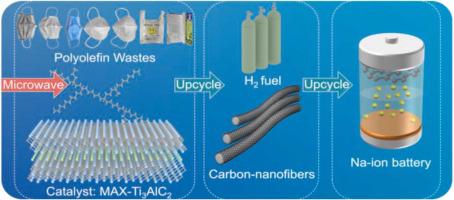Applied Catalysis B: Environment and Energy ( IF 22.1 ) Pub Date : 2022-08-08 , DOI: 10.1016/j.apcatb.2022.121828 Qiang Cao , Hui-Chao Dai , Jing-Hui He , Cheng-Liang Wang , Chang Zhou , Xue-Feng Cheng , Jian-Mei Lu

|
Waste polyolefins, accounting for over half of all plastic wastes, represent a largely untapped resource. Efficiently upcycling polyolefin wastes into value-added resources by catalysis is both economically and environmentally sustainable but rather challenging due to lacking of highly selective catalysts and viable utilization of upcycled products. Herein, MAX (Ti3AlC2) is employed as both microwave-susceptor and catalyst to promote deconstruction of polyethylene (LDPE and HDPE) and polypropylene (PP) into highly pure hydrogen and graphitic nanofibers for Na ion battery. The hydrogen production selectivity of 75 vol % (LDPE), 78 vol% (HDPE) and 78 vol% (PP) are all the highest among reported methods. More importantly, carbon-nanofibers are obtained with high graphitization degree, empowering their application in Na-ion battery as anode electrode materials with good rate capability and stable cycling performance (2000 cycles). Our results demonstrate MAX Ti3AlC2 as a promising microwave-susceptible catalyst and find new applications in energy storage for plastic waste-upcycled resources.
中文翻译:

微波引发的 MAX Ti3AlC2 催化聚烯烃塑料废料的升级循环:选择性转化为用于钠离子电池的氢和碳纳米纤维
废聚烯烃占所有塑料废物的一半以上,是一种很大程度上未开发的资源。通过催化有效地将聚烯烃废物升级为增值资源在经济和环境上都是可持续的,但由于缺乏高选择性催化剂和升级循环产品的可行利用而颇具挑战性。在此,MAX (Ti 3 AlC 2) 用作微波感受器和催化剂,以促进聚乙烯(LDPE 和 HDPE)和聚丙烯 (PP) 解构为用于钠离子电池的高纯度氢和石墨纳米纤维。75 vol% (LDPE)、78 vol% (HDPE) 和 78 vol% (PP) 的产氢选择性均在已报道的方法中最高。更重要的是,获得的碳纳米纤维具有高石墨化程度,使其在钠离子电池中用作具有良好倍率性能和稳定循环性能(2000次循环)的负极材料。我们的研究结果表明 MAX Ti 3 AlC 2是一种很有前途的微波敏感催化剂,并在塑料废物升级回收资源的能量存储中找到了新的应用。


























 京公网安备 11010802027423号
京公网安备 11010802027423号